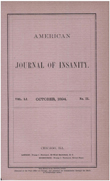Antecedents and consequences of negative life events in adulthood: a longitudinal study
Abstract
OBJECTIVE: This study investigated whether negative life events affected subjects' long-term physical and mental health. METHOD: One hundred thirteen normal college men completed biennial follow-up questionnaires from age 26 until age 62. At age 62 they retrospectively assessed 16 major negative life events with a self-report checklist. A blind rater read each man's complete records over the 35 years and completed the same checklist prospectively. The men had independent physical examinations at age 65. RESULTS: It was demonstrated that negative life events affect men's psychological health more than their physical health. The correlation of negative life events with physical health was so low that no significant relationship between the two variables could be established. Negative life events were significantly associated with affective spectrum disorder and its relevant indicators. Further, the Cox proportional hazards model revealed that negative life events, family history of depression, and psychosocial stability during the college years were independent and statistically significant predictors of depression. CONCLUSIONS: This study supports the widely held belief that biological factors (heredity), psychological factors (unstable personality), and social factors (negative life events) are all etiologically related to depression.
Access content
To read the fulltext, please use one of the options below to sign in or purchase access.- Personal login
- Institutional Login
- Sign in via OpenAthens
- Register for access
-
Please login/register if you wish to pair your device and check access availability.
Not a subscriber?
PsychiatryOnline subscription options offer access to the DSM-5 library, books, journals, CME, and patient resources. This all-in-one virtual library provides psychiatrists and mental health professionals with key resources for diagnosis, treatment, research, and professional development.
Need more help? PsychiatryOnline Customer Service may be reached by emailing [email protected] or by calling 800-368-5777 (in the U.S.) or 703-907-7322 (outside the U.S.).



